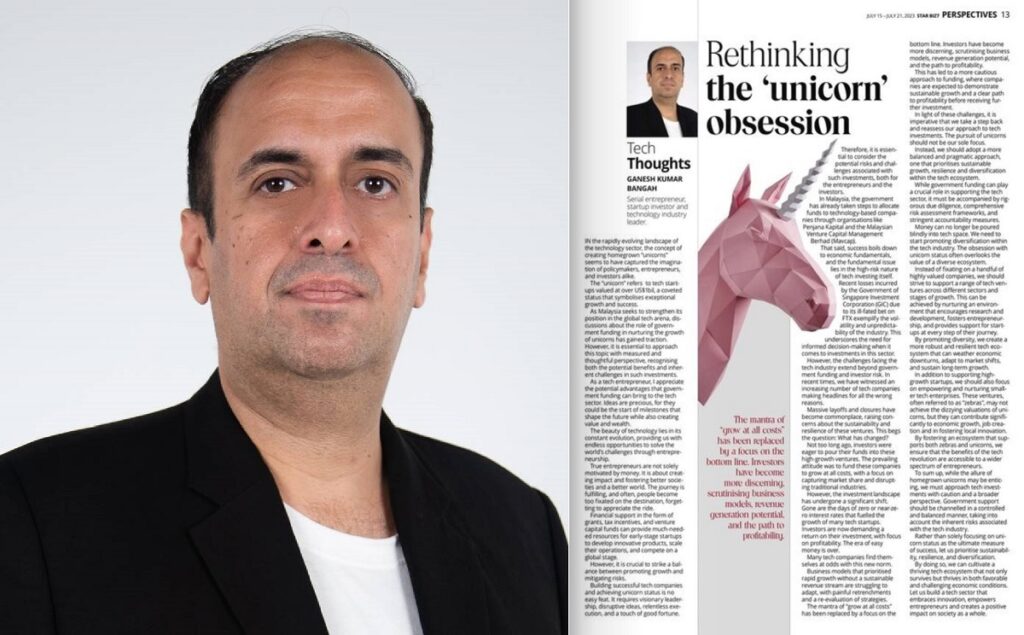The Star Media Group recently launched its new weekly business newspaper Star Biz7 with the objective of being “the go-to source for industry insiders to stay informed and ahead of the curve: From editorial think pieces by celebrated fund managers to interviews with the nation’s top sustainability experts”. Its inaugural edition can be read here.
Certainly captivating among the array of insightful articles is a piece penned by the astute technopreneur, Ganesh Kumar Bangah. His audacious tale of ‘catching the unicorn by its horn’ presents a gripping and pragmatic perspective for the tech industry and startup community, emerging as one of the most compelling and authentic insights in recent times.
For the uninitiated, Ganesh is a pioneer, visionary and leader who has made significant contributions to the world of e-commerce, digital growth and digital payments. Ganesh’s influence is felt not just here in Malaysia, but across the whole of Southeast Asia. He has used technology to democratise access to goods and services and has inspired a new generation of digital entrepreneurs with his success. Today, Ganesh also serves as Executive Chairman of Kuala Lumpur-based Xamble Group Limited, and leading e-commerce ecosystem Commerce.Asia which he founded in 2017.
Here’s Ganesh’s commentary, and credit to The Star for running this compelling piece in its inaugural issue of Star Biz7.
Rethinking the ‘unicorn’ obsession
Tech Thoughts by Ganesh Kumar Bangah
Serial entrepreneur, startup investor and technology industry leader.
In the rapidly evolving landscape of the technology sector, the concept of creating homegrown ‘unicorns’ has captured the imagination of policymakers, entrepreneurs, and investors alike.
The “unicorn” refers to tech startups valued at over $1 billion, a coveted status that symbolises exceptional growth and success.
As Malaysia seeks to strengthen its position in the global tech arena, discussions about the role of government funding in nurturing the growth of unicorns have gained significant traction. However, it is essential to approach this topic with a measured and thoughtful perspective, recognising both the potential benefits and inherent challenges associated with pursuing such investments.
As a tech entrepreneur, I appreciate the potential advantages that government funding can bring to the tech sector. Ideas are precious, for they could be the start of milestones that shape one’s life while also creating value and wealth.
The beauty of technology lies in its constant evolution, providing us with endless opportunities to solve the world’s challenges through entrepreneurship.
True entrepreneurs are not solely motivated by money. It is about creating impact and fostering better societies and a better world. The journey itself is fulfilling, and often, people become too fixated on the destination, forgetting to appreciate the ride.
Financial support in the form of grants, tax incentives, and venture capital funds can provide much-needed resources for early-stage startups to develop innovative products, scale their operations, and compete on a global stage.
However, it is crucial to strike a delicate balance between promoting growth and mitigating risks.
Building successful tech companies and achieving unicorn status is no easy feat. It requires visionary leadership, disruptive ideas, relentless execution, and a touch of good fortune.
Therefore, it is essential to consider the potential risks and challenges associated with such investments, both for the entrepreneurs and the investors.
In Malaysia, the government has already taken steps to allocate funds to technology-based companies through organisations like Penjana Kapital the Malaysian Venture Capital Management Berhad (MAVCAP)
and others.
That said, success boils down to economic fundamentals, and the fundamental issue lies in the high-risk nature of tech investing itself.
Recent losses incurred by the Government of Singapore Investment Corporation (GIC) due to its ill-fated bet on FTX exemplify the inherent volatility and unpredictability of the industry. This underscores the need for careful and informed decision-making when it comes to investments in this sector.
However, the challenges facing the tech industry extend beyond government funding and investor risk. In recent times, we have witnessed an increasing number of tech companies making headlines for all the wrong reasons.
Massive layoffs and closures have become commonplace, raising concerns about the sustainability and resilience of these ventures. This begs the question: What has changed?
Not too long ago, investors were eager to pour their funds into these high-growth ventures. The prevailing attitude was to grow at all costs, with a focus on capturing market share and disrupting traditional industries.
However, the investment landscape has undergone a significant shift. Gone are the days of zero or near-zero interest rates that fuelled the growth of many tech startups. Investors are now demanding a return on their investment and a focus on profitability. The era of easy money is over.
Many tech companies find themselves at odds with this new investing norm.
Business models that prioritised rapid growth without a sustainable revenue stream are struggling to adapt, with painful retrenchments and a re-evaluation of strategies.
The mantra of “grow at all costs” has been replaced by a steadfast focus on the bottom line. Investors have become more discerning, scrutinising business models, revenue generation potential and the path to profitability.
This has led to a more cautious approach to funding, where companies are expected to demonstrate sustainable growth and a clear path to profitability before receiving further investment.
In light of these challenges, it is imperative that we take a step back and reassess our approach to tech investments. The pursuit of unicorns should not be our sole focus.
Instead, we should adopt a more balanced and pragmatic approach, one that prioritises sustainable growth, resilience and diversification within the tech ecosystem.
While government funding can play a crucial role in supporting the tech sector, it must be accompanied by rigorous due diligence, comprehensive risk assessment frameworks, and stringent accountability measures.
Money can no longer be poured blindly into the tech space. We need to start promoting diversification within the tech industry. The obsession with unicorn status often overlooks the value of a diverse ecosystem.
Instead of focusing on a handful of highly valued companies, we should strive to support a range of tech ventures across different sectors and stages of growth. This can be achieved by nurturing an environment that encourages research and development, fosters entrepreneurship, and provides support for startups at every step of their journey.
By promoting diversity, we create a more robust and resilient tech ecosystem that can weather economic downturns, adapt to market shifts, and sustain long-term growth.
In addition to support high growth startups, we should also focus on empowering and nurturing smaller tech enterprises. These ventures, often referred to as “zebras”, may not achieve the dizzying valuations of unicorns, but they can contribute significantly to economic growth, job creation and in fostering local innovation.
By fostering an ecosystem that supports both zebras and unicorns, we ensure that the benefits of the tech revolution are accessible to a wider spectrum of entrepreneurs.
To sum up, while the allure of homegrown unicorns may be enticing, we must approach tech investments with caution and a broader perspective. Government support should be channelled in a controlled and balanced manner, taking into account the inherent risks associated with the tech industry.
Rather than solely focusing on unicorn status as the ultimate measure of success, let us prioritise sustainability, resilience, and diversification.
By doing so, we can cultivate a thriving tech ecosystem that not only survives but thrives in both favourable and challenging economic conditions. Let us build a tech sector that embraces innovation, empowers entrepreneurs and creates a positive impact on society as a whole.
Note: Again, to read the inaugural edition of Star Biz7, click here.
On a separate note, industry players have often remarked that, over at Malaysia Digital Economy Corporation (MDEC), its Senior Vice President Gopi Ganesalingam is doing a stellar job nurturing the local tech ecosystem and in ensuring that it continues to thrive, while enabling jobs and opportunities as well as fostering local innovation for Malaysia. The Malaysian Digital Economy is expected to contribute to some 25.5% to gross domestic product (GDP) by 2025, emerging as a strategic engine of sustainable growth for the country.




